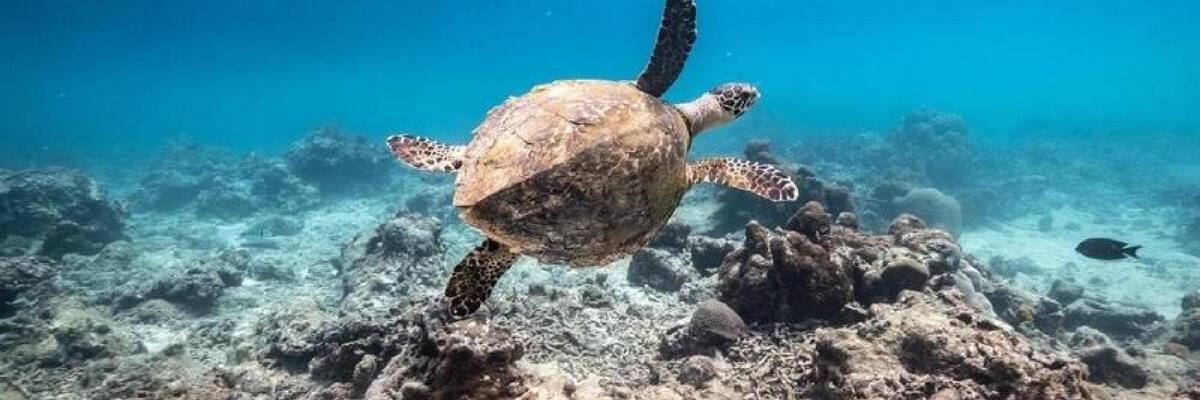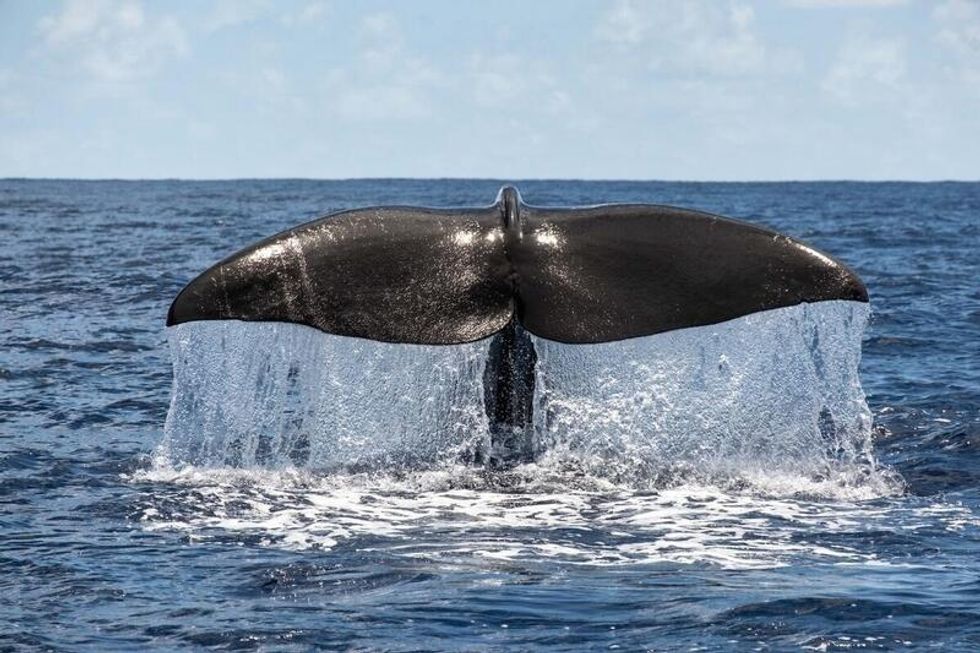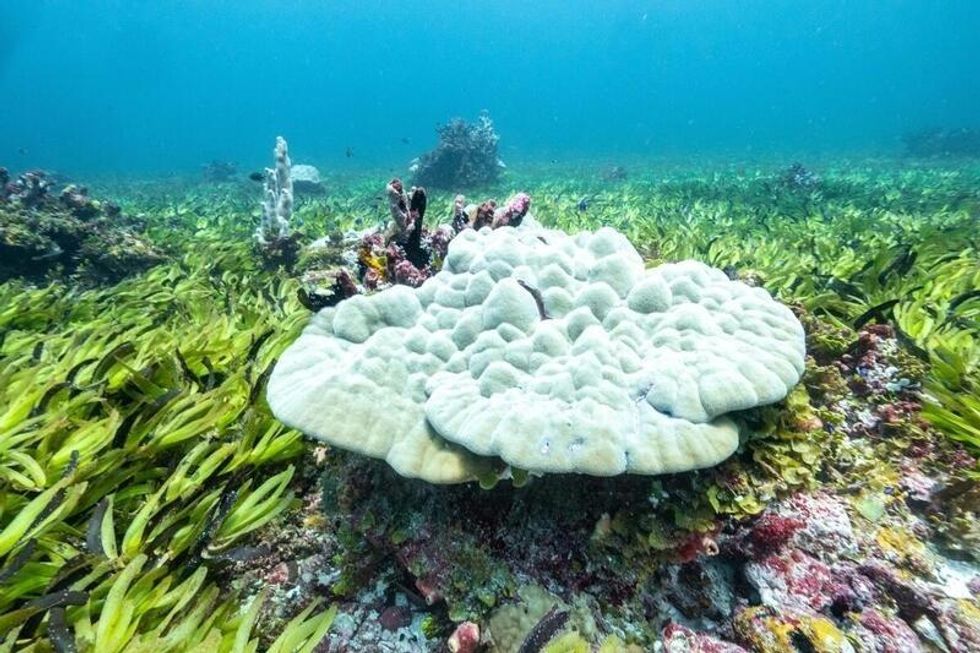

SUBSCRIBE TO OUR FREE NEWSLETTER
Daily news & progressive opinion—funded by the people, not the corporations—delivered straight to your inbox.
5
#000000
#FFFFFF
To donate by check, phone, or other method, see our More Ways to Give page.


Daily news & progressive opinion—funded by the people, not the corporations—delivered straight to your inbox.

A Hawksbill turtle swims off the coast of Mahe, Seychelles. (Photo: Tommy Trenchard/Greenpeace)
The Saya de Malha Bank is a place that few of us have heard of, let alone been to--and as I sit here on the Greenpeace ship Arctic Sunrise, I feel privileged to say that I'm one of the few people who has. A remote area in the middle of the Indian Ocean, between the Seychelles and Mauritius, this underwater plateau the size of Belgium is home to the world's largest seagrass meadow, some of the few shallow water corals so far away from land and an abundance of marine life.
The current rules and laws are not only failing to protect the oceans, but hastening their decline. That's why we need a strong Global Ocean Treaty.
The bank provides feeding habitats for endangered turtles and breeding grounds for majestic sperm whales and pygmy blue whales.
Seagrass meadows occupy a vanishingly small area of our oceans but capture up to twice as much carbon dioxide as forests on land, making them extremely important for our climate and the balance of the ocean. This applies to the cold-water eelgrass meadows in Sweden, where I come from, as well as seagrass meadows in tropical waters. They function as nurseries for vulnerable cod spawn in the north and feeding grounds for sea turtles and dugongs in the Indian Ocean. But these ecosystems are in decline across the globe due to human activity, making it crucial to protect the remaining areas.
The Saya de Malha Bank has been identified as an ecologically and biologically significant area of global interest by scientific experts. Places like these could be safe havens for marine life, protected in a vast network of ocean sanctuaries across our blue planet.
But the rich wildlife, especially the shoals of tuna that pass by on their journey through the high seas, attracts the real predators: the fishing industry. A few powerful fishing nations are depleting marine life around the world, and this hotspot in the heart of the Indian Ocean is no exception. Industrial fishing vessels from the E.U., mainly Spain and France, fish for yellowfin tuna, a population that has been classified as overfished for several years.
These vessels use huge fishing nets that can stretch for two kilometers and reach 200 meters deep. The net is placed in a ring around a school of fish and pulled together from below--scooping up pretty much anything that gets in its way. Turtles, whales, and sharks can be caught up in the net as 'bycatch' and young yellowfin tuna are trapped before they have a chance to reproduce.

The other type of destructive fishing that takes place around Saya de Malha Bank is longline fishing. This method is used by around 500 ships, from distant water fleets, using a single long line, anywhere from 50 to 120 kilometers long, with thousands of hooks. Can't imagine that? It's like 1,000 football pitches, laid end to end. The biggest problem with this fishing method is that it also catches and kills many other animals as bycatch, especially already endangered sharks.
We must ensure that rich companies and nations stop this destruction of life in the oceans, which not only impoverishes wildlife but also the coastal communities that are truly dependent on small-scale fishing for survival. It's critical that we protect important areas of the ocean to give marine life a chance to recover and thrive.
Today, there is no legal mechanism for creating ocean sanctuaries in international waters and less than 1% of the global ocean is actually protected from destructive fishing. Due to a widespread failure to adhere to scientific advice, the fishing industry is free to continue destroying marine ecosystems through destructive fishing methods and overfishing in sensitive areas.

It's clear to us at Greenpeace, as well as to millions of people around the world, that the current rules and laws are not only failing to protect the oceans, but hastening their decline. That's why we need a strong Global Ocean Treaty. A treaty that would enable the creation of a network of ocean sanctuaries in international waters: areas free from destructive fishing and other threats to marine life.
Governments are negotiating this treaty at the U.N. already--we have an opportunity to make history if we get this right. Join us in calling for governments around the world to take action to protect our oceans: join over 3.5 million people and sign the petition.
Dear Common Dreams reader, The U.S. is on a fast track to authoritarianism like nothing I've ever seen. Meanwhile, corporate news outlets are utterly capitulating to Trump, twisting their coverage to avoid drawing his ire while lining up to stuff cash in his pockets. That's why I believe that Common Dreams is doing the best and most consequential reporting that we've ever done. Our small but mighty team is a progressive reporting powerhouse, covering the news every day that the corporate media never will. Our mission has always been simple: To inform. To inspire. And to ignite change for the common good. Now here's the key piece that I want all our readers to understand: None of this would be possible without your financial support. That's not just some fundraising cliche. It's the absolute and literal truth. We don't accept corporate advertising and never will. We don't have a paywall because we don't think people should be blocked from critical news based on their ability to pay. Everything we do is funded by the donations of readers like you. Will you donate now to help power the nonprofit, independent reporting of Common Dreams? Thank you for being a vital member of our community. Together, we can keep independent journalism alive when it’s needed most. - Craig Brown, Co-founder |
The Saya de Malha Bank is a place that few of us have heard of, let alone been to--and as I sit here on the Greenpeace ship Arctic Sunrise, I feel privileged to say that I'm one of the few people who has. A remote area in the middle of the Indian Ocean, between the Seychelles and Mauritius, this underwater plateau the size of Belgium is home to the world's largest seagrass meadow, some of the few shallow water corals so far away from land and an abundance of marine life.
The current rules and laws are not only failing to protect the oceans, but hastening their decline. That's why we need a strong Global Ocean Treaty.
The bank provides feeding habitats for endangered turtles and breeding grounds for majestic sperm whales and pygmy blue whales.
Seagrass meadows occupy a vanishingly small area of our oceans but capture up to twice as much carbon dioxide as forests on land, making them extremely important for our climate and the balance of the ocean. This applies to the cold-water eelgrass meadows in Sweden, where I come from, as well as seagrass meadows in tropical waters. They function as nurseries for vulnerable cod spawn in the north and feeding grounds for sea turtles and dugongs in the Indian Ocean. But these ecosystems are in decline across the globe due to human activity, making it crucial to protect the remaining areas.
The Saya de Malha Bank has been identified as an ecologically and biologically significant area of global interest by scientific experts. Places like these could be safe havens for marine life, protected in a vast network of ocean sanctuaries across our blue planet.
But the rich wildlife, especially the shoals of tuna that pass by on their journey through the high seas, attracts the real predators: the fishing industry. A few powerful fishing nations are depleting marine life around the world, and this hotspot in the heart of the Indian Ocean is no exception. Industrial fishing vessels from the E.U., mainly Spain and France, fish for yellowfin tuna, a population that has been classified as overfished for several years.
These vessels use huge fishing nets that can stretch for two kilometers and reach 200 meters deep. The net is placed in a ring around a school of fish and pulled together from below--scooping up pretty much anything that gets in its way. Turtles, whales, and sharks can be caught up in the net as 'bycatch' and young yellowfin tuna are trapped before they have a chance to reproduce.

The other type of destructive fishing that takes place around Saya de Malha Bank is longline fishing. This method is used by around 500 ships, from distant water fleets, using a single long line, anywhere from 50 to 120 kilometers long, with thousands of hooks. Can't imagine that? It's like 1,000 football pitches, laid end to end. The biggest problem with this fishing method is that it also catches and kills many other animals as bycatch, especially already endangered sharks.
We must ensure that rich companies and nations stop this destruction of life in the oceans, which not only impoverishes wildlife but also the coastal communities that are truly dependent on small-scale fishing for survival. It's critical that we protect important areas of the ocean to give marine life a chance to recover and thrive.
Today, there is no legal mechanism for creating ocean sanctuaries in international waters and less than 1% of the global ocean is actually protected from destructive fishing. Due to a widespread failure to adhere to scientific advice, the fishing industry is free to continue destroying marine ecosystems through destructive fishing methods and overfishing in sensitive areas.

It's clear to us at Greenpeace, as well as to millions of people around the world, that the current rules and laws are not only failing to protect the oceans, but hastening their decline. That's why we need a strong Global Ocean Treaty. A treaty that would enable the creation of a network of ocean sanctuaries in international waters: areas free from destructive fishing and other threats to marine life.
Governments are negotiating this treaty at the U.N. already--we have an opportunity to make history if we get this right. Join us in calling for governments around the world to take action to protect our oceans: join over 3.5 million people and sign the petition.
The Saya de Malha Bank is a place that few of us have heard of, let alone been to--and as I sit here on the Greenpeace ship Arctic Sunrise, I feel privileged to say that I'm one of the few people who has. A remote area in the middle of the Indian Ocean, between the Seychelles and Mauritius, this underwater plateau the size of Belgium is home to the world's largest seagrass meadow, some of the few shallow water corals so far away from land and an abundance of marine life.
The current rules and laws are not only failing to protect the oceans, but hastening their decline. That's why we need a strong Global Ocean Treaty.
The bank provides feeding habitats for endangered turtles and breeding grounds for majestic sperm whales and pygmy blue whales.
Seagrass meadows occupy a vanishingly small area of our oceans but capture up to twice as much carbon dioxide as forests on land, making them extremely important for our climate and the balance of the ocean. This applies to the cold-water eelgrass meadows in Sweden, where I come from, as well as seagrass meadows in tropical waters. They function as nurseries for vulnerable cod spawn in the north and feeding grounds for sea turtles and dugongs in the Indian Ocean. But these ecosystems are in decline across the globe due to human activity, making it crucial to protect the remaining areas.
The Saya de Malha Bank has been identified as an ecologically and biologically significant area of global interest by scientific experts. Places like these could be safe havens for marine life, protected in a vast network of ocean sanctuaries across our blue planet.
But the rich wildlife, especially the shoals of tuna that pass by on their journey through the high seas, attracts the real predators: the fishing industry. A few powerful fishing nations are depleting marine life around the world, and this hotspot in the heart of the Indian Ocean is no exception. Industrial fishing vessels from the E.U., mainly Spain and France, fish for yellowfin tuna, a population that has been classified as overfished for several years.
These vessels use huge fishing nets that can stretch for two kilometers and reach 200 meters deep. The net is placed in a ring around a school of fish and pulled together from below--scooping up pretty much anything that gets in its way. Turtles, whales, and sharks can be caught up in the net as 'bycatch' and young yellowfin tuna are trapped before they have a chance to reproduce.

The other type of destructive fishing that takes place around Saya de Malha Bank is longline fishing. This method is used by around 500 ships, from distant water fleets, using a single long line, anywhere from 50 to 120 kilometers long, with thousands of hooks. Can't imagine that? It's like 1,000 football pitches, laid end to end. The biggest problem with this fishing method is that it also catches and kills many other animals as bycatch, especially already endangered sharks.
We must ensure that rich companies and nations stop this destruction of life in the oceans, which not only impoverishes wildlife but also the coastal communities that are truly dependent on small-scale fishing for survival. It's critical that we protect important areas of the ocean to give marine life a chance to recover and thrive.
Today, there is no legal mechanism for creating ocean sanctuaries in international waters and less than 1% of the global ocean is actually protected from destructive fishing. Due to a widespread failure to adhere to scientific advice, the fishing industry is free to continue destroying marine ecosystems through destructive fishing methods and overfishing in sensitive areas.

It's clear to us at Greenpeace, as well as to millions of people around the world, that the current rules and laws are not only failing to protect the oceans, but hastening their decline. That's why we need a strong Global Ocean Treaty. A treaty that would enable the creation of a network of ocean sanctuaries in international waters: areas free from destructive fishing and other threats to marine life.
Governments are negotiating this treaty at the U.N. already--we have an opportunity to make history if we get this right. Join us in calling for governments around the world to take action to protect our oceans: join over 3.5 million people and sign the petition.